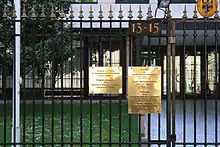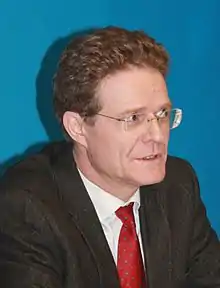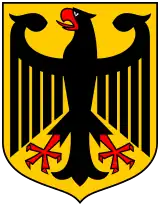| Ambassador of Germany to France | |
|---|---|
| Deutschen Botschafter in Frankreich | |
 | |
| Style | Ambassador extraordinary and plenipotentiary |
| Residence | Paris |
| Inaugural holder | Harry von Arnim |
| Formation | 1871 |
This is an incomplete list of ambassadors from Germany to France.
Diplomatic missions



In 1874, the Embassy in Paris was one of only four Germany embassies alongside London, Saint Petersburg, and Vienna, Today, of 226 diplomatic missions abroad, Germany has five diplomatic and consular missions in France. The German Embassy is in Paris.[1] In 1961, France returned the Hôtel de Beauharnais, the former German embassy in Paris which had been expropriated by France at the end of World War II, as a gesture of solidarity between the two nations.[2] Additionally, there are four consulates-general in Bordeaux, Lyon, Marseille and Strasbourg.[3][4]
The Hôtel de Beauharnais in the 7th arrondissement of Paris serves as the official residence of the German Ambassador to France.[5]
Ambassadors
Ambassadors of the German Empire
- 1871–1873: Harry von Arnim[6]
- 1874–1885: Chlodwig, Prince of Hohenlohe-Schillingsfürst
- 1885–1900: Georg Herbert Münster[7]
- 1900–1910: Hugo von Radolin[8]
- 1910–1914: Wilhelm von Schoen[9]
Ambassadors of the Weimar Republic
- 1920–1923: Wilhelm Mayer[10]
- 1924–1932: Leopold von Hoesch[11][12]
Ambassadors of Nazi Germany
- 1933–1935: Roland Köster
- 1936–1939: Johannes von Welczeck[13]
- 1940–1944: Otto Abetz[14]
Ambassadors of the German Democratic Republic
- 1956–1962: Herbert Merkel
- 1962–1962: Herbert Schulze
- 1963–1967: Willi Diebenkorn
- 1967–1973: Gerhard Schramm
- 1973–1974: Gerhard Schramm
- 1974–1976: Ernst Scholz[15]
- 1976–1984: Werner Fleck
- 1984–1990: Alfred Marter
Ambassadors of the Federal Republic of Germany
West Germany
- 1950–1955: Wilhelm Hausenstein
- 1955–1958: Vollrath von Maltzan[16][17]
- 1963–1965: Herbert Blankenhorn[18]
- 1965–1968: Manfred Klaiber
- 1968–1970: Sigismund von Braun[19]
- 1970–1972: Hans Hellmuth Ruete
- 1972–1976: Sigismund von Braun[20]
- 1976–1983: Axel Herbst
- 1983–1987: Franz Jochen Schoeller[21]
- 1987–1991: Franz Pfeffer
Post-German reunification

- 1991–1995: Jürgen Sudhoff[22]
- 1995–1998: Immo Stabreit[23]
- 1998–2000: Peter Hartmann
- 2000–2004: Fritjof von Nordenskjöld
- 2004–2007: Klaus Neubert
- 2007–2008: Peter Ammon
- 2008–2012: Reinhard Schäfers
- 2012–2015: Susanne Wasum-Rainer
- 2015–2020: Nikolaus Meyer-Landrut[24][4]
- 2020–date: Hans-Dieter Lucas[25]
Envoys from the German States (before 1871)
Baden envoys
- 1791: Establishment of diplomatic relations
- 1713–1734: Johann Rudolf Fäsch
- 1761–1762: Ulrich von Thun
- 1772–1781: Pierre Samuel du Pont de Nemours
- 1781–1782: Giorgio di Santi
- 1783–1789: Pierre Samuel du Pont de Nemours
- 1789–1803:
- 1803–1809: Emmerich Joseph von Dalberg
- 1810–1831: Johann Baptist von Pfirdt
- 1831–1843: Christian Friedrich Gerstlacher
- 1843–1846: Franz Xaver von Andlaw-Birseck
- 1846–1871: Ferdinand Allesina von Schweitzer[26]
Bavarian envoys
Envoys from the Electorate of Bavaria
- 1666: Establishment of diplomatic relations
- 1733–1736: Louis Joseph d’Albert de Luynes von Grimbergen[27]
- 1737–1741: Ignaz von Törring[28]
- 1741–1742: Louis Joseph d’Albert de Luynes von Grimbergen[27]
- 1742–1743: von Spon
- 1743–1745: Joseph Piosasque de Non
- 1745–1747: Louis Joseph d’Albert de Luynes von Grimbergen[27]
- 1747–1755:
- 1755–1777: Maximilian von Eyck
- 1778–1787: Karl Heinrich Joseph von Sickingen
- 1787–1799: Vacant
- 1799–1805: Anton von Cetto[29]
Envoys of the Kingdom of Bavaria
- 1806–1813: Anton von Cetto
- 1813-1817: No relations
- 1817–1821: Wilibald von Rechberg and Rothenlöwen
- 1821-1823: Vacant
- 1823–1827: Franz Gabriel von Bray-Steinburg
- 1827–1834: Christian Hubert von Pfeffel
- 1835–1839: Franz Oliver von Jenison-Walworth
- 1840–1846: Friedrich von Luxburg
- 1846–1847: Ludwig von Oettingen-Wallerstein
- 1847-1850: Vacant
- 1850–1866: August von Wendland
- 1866–1868: Maximilian Joseph Pergler von Perglas
- 1868–1871: Friedrich von Quadt-Wykradt-Isny
- 1871–1877: Gideon von Rudhart
- 1877–1889: Johann von Reither
- 1889–1896: Heinrich Tucher von Simmelsdorf
- 1896–1903: Rudolph von und zu der Tann-Rathsamhausen
- 1903–1903: Georg von und zu Guttenberg
- 1903–1906: Karl Moy de Sons
- 1906–1909: Friedrich von Ortenburg
- 1909–1914: Lothar von Ritter zu Groenesteyn
- 1914: End of diplomatic relations
Hanseatic envoys
- 1689–1717: Christophle Brosseau
- 1717–1727: Jacques de Cagny
- 1727–1729: Antoine Poille
- 1730–1776: Luc Courchetet d’Esnans
- 1776–1785: Louis d’Hugie
- 1785–1786: Jean Diodati
- 1786–1793: Michel-Alexis Fauvet de La Flotte
- 1795–1803: Friedrich Joachim Schlüter
- 1803–1810: Konrad Christoph Abel
- 1810–1814: No relations while the Hanseatic cities belonged to the Holy Roman Empire.
- 1814–1823: Konrad Christoph Abel
- 1824–1864: Vincent Rumpff
- 1864–1870: Hermann von Heeren
Prussian envoys
Envoys from the Elector of Brandenburg
- 1648: Establishment of diplomatic relations
- 1626–1649: Abraham de Wicquefort
- 1658: Christoph von Brandt
Ambassadors of the King of Prussia

- 1716–1717: Adam Otto von Viereck
- 1717–1719: Friedrich Ernst zu Innhausen und Knyphausen
- 1721–1751: Jean de Chambrier
- 1751–1754: George Keith
- 1754–1756: Dodo Heinrich zu Innhausen und Knyphausen
- 1756–1763: None due to the Seven Years' War
- 1768–1792: Wilhelm Bernhard von der Goltz
- 1792: Break in relations due to French Revolutionary Wars
- 1815–1822: Karl von der Goltz
- 1824–1837: Heinrich von Werther
- 1841–1845: Heinrich Friedrich von Arnim
- 1846–1848: Heinrich Alexander von Arnim
- 1849–1859: Maximilian von Hatzfeldt-Trachenberg
- 1859–1861: Albert von Pourtalès
- 1862–1862: Otto von Bismarck
- 1862–1868: Robert Heinrich Ludwig von der Goltz
Ambassadors of the North German Confederation
- 1868–1869: Robert von der Goltz
- 1869–1870: Karl von Werther
Saxon envoys
Envoys from the Electorate of Saxony
- 1664: Establishment of diplomatic relations
- 1709–1720: Burchard von Suhm
- 1720–1729: Carl Heinrich von Hoym
- 1729–1734: Samuel de Brais
- 1735–1737: Vacant
- 1737–1741: Samuel de Brais
- 1741–1753: Johann Adolph von Loß
- 1753–1754: Samuel Gottfried Spinnhirn
- 1754–1755: Claude Marie Noyel Bellegarde d'Entremont
- 1755–1757: Ludwig Siegfried Vitzthum von Eckstädt
- 1757–1768: Kaspar Franz von Fontenay
- 1768–1770:
- 1770–1772: Johann Georg Heinrich von Werthern
Envoys from the Kingdom of Saxony
- 1815–1827: Carl Emil von Üchtritz
- 1827–1828: Georg Rudolf von Gersdorff
- 1828–1849: Hans Heinrich von Könneritz
- 1850–1852: Karl Adolf von Hohenthal-Knauthain
- 1853–1870: Albin Leo von Seebach
- 1870–1871: Vacant
Württemberg envoys
- 1650: Establishment of diplomatic relations
- 1814–1815: Ferdinand Ludwig von Zeppelin
- 1815–1817: R. von Schwarz
- 1817–1820: Peter von Gallatin
- 1821–1838: Bernhard von Mülinen
- 1838–1849: Christian Wilhelm August von Fleischmann
- 1849–1850: Vacant
- 1850–1871: August von Wächter
- 1871: Dissolution of legation
See also
References
- ↑ "The Germany Embassy in Paris | France". www.allemagneenfrance.diplo.de/. Retrieved 17 April 2020.
- ↑ Times, Special to The New York (21 July 1961). "Germany Regains Old Paris Embassy". The New York Times. Retrieved 17 April 2020.
- ↑ Embassy of Germany in Paris
- 1 2 Amt, Auswärtiges. "France". auswaertiges-amt.de. German Federal Foreign Office. Retrieved 17 April 2020.
- ↑ Base Mérimée: Hôtel de Beauharnais, actuellement résidence de l'ambassadeur d'Allemagne, Ministère français de la Culture. (in French)
- ↑ "Complaint of President Grant The French Ambassador in England The Next German Ambassador to France. Etienne Arago's Mission to Italy Garibaidi Again invited to the Assembly". The New York Times. 26 February 1871. Retrieved 11 February 2021.
- ↑ "PRINCE MUENSTER RESIGNS.; Gives Up German Ambassadorship at Paris on Account of His Great Age". The New York Times. 29 November 1900. Retrieved 10 February 2021.
- ↑ "To be German Ambassador to France". The New York Times. 30 November 1900. Retrieved 11 February 2021.
- ↑ "GERMAN ENVOY RECEIVED.; French Recognition of Mayer Restores Pre-War Diplomatic Relations". The New York Times. 30 September 1920. Retrieved 11 February 2021.
- ↑ "DR. WILHELM MAYER IS DEAD AT MUNICH; German Ambassador Left France td the Beginning of the Occupation of the Ruhr". The New York Times. 7 March 1923. Retrieved 11 February 2021.
- ↑ "BERLIN NAMES ENVOYS.; Hoesch Promoted Ambassador to Paris, Keller Sent to Brussels". The New York Times. 3 February 1924. Retrieved 11 February 2021.
- ↑ TIMES, Special Cable to THE NEW YORK (11 April 1936). "VON HOESCH DIES; GERMAN DIPLOMAT; Ambassador to London, Under Strain Since Locarno Coup, Succumbs to Heart Attack". The New York Times. Retrieved 11 February 2021.
- ↑ TIMES, Wireless to THE NEW YORK (14 August 1939). "REICH ENVOY QUITS FRANCE IN A HURRY; Welczeck Is Believed to Be on Way to Report to Hitler on the Situation in Paris". The New York Times. Retrieved 11 February 2021.
- ↑ "OTTO ABETZ". The New York Times. 30 October 1945. Retrieved 11 February 2021.
- ↑ Binder, David (10 December 1961). "East Berlin Guns Fire Over Border; Shooting by Guards Is First Since Early October". The New York Times. Retrieved 11 February 2021.
- ↑ Times, the New York Times Company by Wireless To the New York (24 September 1927). "BARON VON MALTZAN AND 5 OTHERS KILLED IN REICH AIR CRASH; Lufthansa Plane Carrying the Ambassador Crumples as One Wing Is Severed. PASSENGERS DIE INSTANTLY Talk of Sabotage Discredited and Cause of Disaster May Never Be Known. GREAT SHOCK TO GERMANY Washington, Where Envoy Was Very Popular, Profoundly Moved -- Fervent Tributes Paid to Him. BARON VON MALTZAN AND 5 OTHERS KILLED". The New York Times. Retrieved 11 February 2021.
- ↑ Sullivan, Walter (15 November 1955). "BONN-SOVIET TALK ON TIES STALLED; Complicated Issues Arise in Paris -- Moscow Halts Return of Prisoners". The New York Times. Retrieved 11 February 2021.
- ↑ Times, Special to The New York (27 February 1969). "Western European Council Meets Again Without France". The New York Times. Retrieved 11 February 2021.
- ↑ Middleton, Drew (31 March 1965). "DE GAULLE IS TOLD OF BONN 'DISQUIET'; Partly Reassures Envoy on Rejection of Unity Talks". The New York Times. Retrieved 11 February 2021.
- ↑ Sulzberger, C. L. (13 March 1968). "Foreign Affairs: A New Look in Paris". The New York Times. Retrieved 11 February 2021.
- ↑ "FRENCH JOIN CEREMONY FOR GERMAN WAR DEAD LA CAMBE, France, June 8 (AP) - Officials from France and West Germany gathered today to honor German soldiers who died trying to hold back the Allied forces in Normandy 40 years ago". The New York Times. 9 June 1984. Retrieved 11 February 2021.
- ↑ Markham, James M.; Times, Special To the New York (30 August 1985). "SPY SCANDAL IN WEST GERMANY WIDENS". The New York Times. Retrieved 11 February 2021.
- ↑ Tribune, International Herald (27 July 1993). "Opinion | Makings of the Balkan War : Letters to the Editor". The New York Times. Retrieved 11 February 2021.
- ↑ Christoph Scheuermann and Christoph Schult (April 18, 2018), Außenpolitik: Maas wechselt deutsche Botschafter aus Spiegel Online.
- ↑ Stam, Claire; Grüll, Philipp (7 December 2020). "Europe must become more sovereign, says German ambassador to France". www.euractiv.com. Retrieved 10 February 2021.
- ↑ The Titled Nobility of Europe: An International Peerage, Or "Who's Who", of the Sovereigns, Princes and Nobles of Europe. Harrison & Sons. 1914. p. 1337. Retrieved 11 February 2021.
- 1 2 3 "Das" Rheinufer von Coblenz bis Bonn; 12. Band: Mittelrhein : 312 (in German). 1866. p. 219. Retrieved 11 February 2021.
- ↑ Freising.), Antonius von Steichele (abp of Munich and (1883). Das Bisthum Augsburg, historisch und statistisch beschrieben von A. Steichele (fortgesetzt von A. Schröder, F. Zoepfl) (in German). p. 954. Retrieved 11 February 2021.
- ↑ Acton, John Emerich Edward Dalberg Acton Baron (1975). Lord Acton and the First Vatican Council: A Journal. Catholic Theological Faculty. p. X. ISBN 978-0-909246-11-2. Retrieved 11 February 2021.




